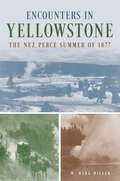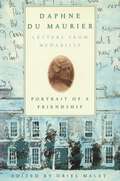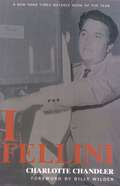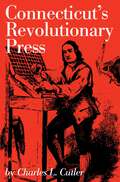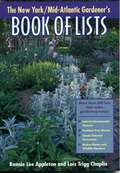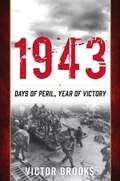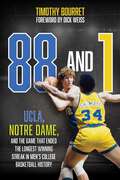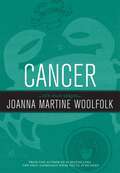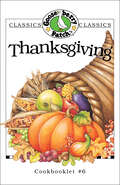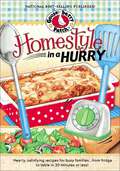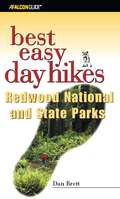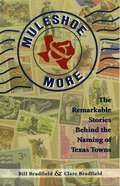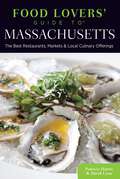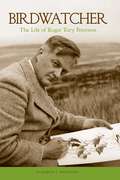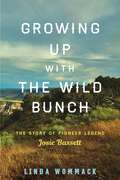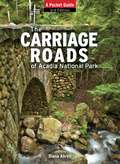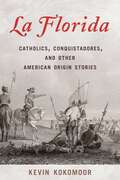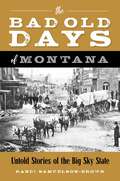- Table View
- List View
Encounters in Yellowstone: The Nez Perce Summer of 1877
by M. Mark MillerOn August 23, 1877, a scout named Jack Bean watched 600 Nez Perce Indians head into the new Yellowstone National Park. Bean rushed 60 miles to the nearest telegraph office to tell the army where the Indians were going. He didn&’t take time to warn tourists who were visiting the park that was then a roadless wilderness. The Indians flight for freedom is a touchstone of the history of the American West, so most people know about their 1,200-mile running battle with the army that ended just forty miles from the Canadian border and freedom. However few know the stories of the confrontations between the Nez Perce and park tourists. Encounters in Yellowstone tells about those thrilling adventures: Emma Cowan&’s watching Indians shoot her husband in the head and then taking her captive; Andrew Weikert&’s blazing gun battles when he tries to rescue friends missing after an Indian attack, and George Cowan&’s six-mile crawl to get help after he was shot three times and left for dead. The book tells these and other true stories with all the detail and drama of fiction.
Daphne du Maurier: Letters from Menabilly Portrait of a Friendship
by Daphne Du MaurierDaphne du Maurier&’s correspondence with Oriel Malet began in the early 1950s, after they met at a cocktail party in London. At least twenty years separated them: Oriel was a gauche young writer while Daphne was the famous, much-fêted author of bestselling novels including Jamaica Inn, My Cousin Rachel, and Rebecca.The friendship flourished for thirty years, fed by the letters that arrived faithfully from Menabilly, the du Maurier house in Cornwall. While Oriel tasted life on a houseboat on the Seine and mixed with the aristocratic Who&’s Who of Paris, Daphne&’s letters tell of her family, past and present, her marriage to General Sir Frederick Browning—a war hero known privately as &‘Moper&’ whose fits of melancholy caused many a crisis at Menabilly—and events like Prince Philip coming for dinner: &‘We&’ve got only four knives with handles, and one silver candlestick must be glued!&’ Most of all, her letters are a valuable record of the complex and rigorous art of a fine and well-loved writer: the &‘brewing&’ of a plot, the research, and the &‘pegging&’ of secret fantasies onto a living person in order to create classical characters such as Cousin Rachel and Roger Kylmerth.Disarmingly frank about sex, an earnest seeker after spiritual and psychological truth, Daphne du Maurier is revealed in her letters as an inspiring and delightful correspondent—as well as a once-in-a-lifetime friend.
I, Fellini
by Federico Fellini Charolette ChandlerForged from the many conversations Charlotte Chandler conducted with director Federico Fellini over the course of fourteen years, and featuring a forward by Billy Wilder, I, Fellini is a portrait of one of Italy's greatest filmmakers in his own words. In the book, Fellini recounts the stories behind his classic films La Dolce Vita, 8 1/2, La Strada, and others, describing the inspirations from which they arose and the struggles to get them filmed. He also speaks at length on actors Marcello Mastroianni, Anita Ekberg, Sophia Loren, and Anna Magnani, and on directors Roberto Rossellini, Ingmar Bergman, and Michelangelo Antonioni.
Back to Protein: The Low Carb/No Carb Meat Cookbook
by Barbara Hartsock DoyenThis cookbook is for health-conscious carnivores who are tired of the vegan rhetoric.
Woods Cop eBook Gift Set
by Joseph HeywoodGet your fix of not one, not two, but three of the Woods Cop Mystery series! This triple-thrill pack includes three of Joseph Heywood&’s mystery novels: Ice Hunter, Blue Wolf in Green Fire, and Chasing a Blond Moon. Each novel takes the reader on a suspenseful journey through the wild against vicious poachers and hunters. This package is the perfect introduction to this thrilling mystery series featuring conservation officers in Michigan&’s Upper Peninsula.
Connecticut's Revolutionary Press
by Charles L. CutlerIn the years leading up to the American Revolution, tensions were high, but not everyone felt the same effects of British oppression. Connecticut newspapers took up the mantle to not just report the injustices, but actively convince and insight their readers to stand up and rebel. Charles Cutter lays bare the influence of the press to start the war that gave birth to our nation as we know it.As one phase of the Bicentennial observation, The American Revolution Bicentennial Commission of Connecticut has authorized scholars in a wide range of study to write a series of monographs on the broadly defined Revolutionary Era of 1763 to 1787. These monographs [appeared] yearly beginning in 1973 through 1980. Emphasis is placed upon the birth of the nation, rather than on the winning of independence on the field of battle.
Insiders' Guide®: Your Guide to an Hour, a Day, or a Weekend in the City (Insiders' Guide Series)
by Rachel DresbeckInsiders&’ Guide in Your Pocket is a new series of miniguides that distill the best of the trusted Insiders&’ Guide® series into easy-to-use, portable, quick references—each with two popout® maps and detailed listings on hotels, restaurants, and attractions, as well as suggested itineraries. By true insiders, they offer a personal and practical perspective that readers everywhere have come to know and love from Insiders&’ Guides. The essential new source for easy-access travel information for some of America&’s most appealing destinations, these guides are just right for an afternoon or a weekend&’s fun.• Two popout® maps• Full-color interior, in a highly portable, 5 1/8 x 3 3/4 trim size• The inside scoop on popular area attractions• Where to eat, shop, play, and stay• Arts & cultural activities
New York/Mid-Atlantic Gardener's Book of Lists
by Bonnie Lee Appleton Lois Trigg ChaplinCompiles vital information for gardeners in the unique climates of New York and the mid-Atlantic area, including Virginia, West Virginia, District of Columbia, Maryland, Delaware, New Jersey, Pennsylvania, and southern New York and Long Island.
The Colorado Gardener's Companion: A Guide to Low-Maintenance Gardening in the Centennial State
by Jodi TorpeyYour Guide to a Bountiful GardenThe Colorado Gardener&’s Companion is your guide to cultivating a successful garden in the Centennial State. Whether you&’re an experienced green thumb or an inquiring novice, whether you live in the Mountains or in the Western Slope, along the Front Range, or on the Eastern Plains, this updated guide will help you grow bountiful vegetables, abundant flowers, and lush lawns. You Will Learn:The best high-performance plant varieties for your area of the stateHow to prepare and plant for each season and weather scenarioHundreds of expert and eco-friendly gardening tips and tricks
1943: Days of Peril, Year of Victory
by Victor BrooksMilitary historian Victor Brooks argues that the year 1943 marked a significant shift in the World War II balance of power from the Axis to Allied forces. Brooks presents a global narrative of the American experience of war during the year, ranging from the tiny blood-drenched island of Tarawa to the vast expanses of North Africa. At no other period was the course of the war in such precarious balance, the author argues, as both Axis and Allies possessed roughly equivalent power, and as both sides still had reasonable expectations that victory could be achieved.At the beginning of 1943, the tide was slowly turning for the Americans and their allies, Still, the shame of terrible defeats on Bataan and in the Java Sea, at Dieppe and Savo Island were very recent memories. Early on, Americans had high hopes for a massive improvement in the direction of the war; by the end of the year, those hopes were becoming realities. The year 1943 is also the period in which the titans of the war were just emerging. Douglas MacArthur, Dwight Eisenhower, Chester Nimitz, William Halsey, George Patton, Holland Smith and other iconic leaders had begun surfacing as household names in 1943 and would form a nucleus of the command structure that shattered the Axis in 1944 and 1945.In 1943, Brooks presents the history of the year when some of the most exciting and important moments occurred on the road to Allied victory.
Willie: An Autobiography
by Bud Shrake Willie NelsonWillie Nelson is more than just a singer whose albums have captures this country's imagination for more than thirty years: he is the nearest thing we have to the poet laureate of America's heart and the heartland. Told with frankness, warmth and earthy humor, here is Willie's story: his depression ere childhood; his stormy marriages; his will experiences with drugs, booze and women; his long rise to stardom; his musical and personal experiences with Waylon Jennings, Julio Iglesias, Kris Kristopherson, Johnny Cash, Ray Charles, Loretta Lynn, George Jones, Frank Sinatra and Linda Ronstadt.
88 and 1: UCLA, Notre Dame, and the Game That Ended the Longest Winning Streak in Men's College Basketball History
by Timothy BourretUCLA&’s 88-game winning streak between 1970 and 1974 is undoubtedly one of the greatest accomplishments in the history of college sports. It is 28 games longer than any other streak in college basketball history and the closest anyone has come in the almost 50 years since it was established is UNLV&’s 45-game streak between 1989–91. John Wooden&’s team was so dominant that it won 48 of the 88 games by at least 20 points and had just eight wins by five or less. The Bruins&’ personnel featured multiple national player of the year selections, All-Americans, and 13 different players who went on to play in the NBA, including Bill Walton, Jamaal Wilkes, and Marques Johnson. 88 and 1 documents this incredible run and the losses that bracketed the streak, victories by Notre Dame over #1 ranked UCLA teams in the same building that was just a few miles from Wooden&’s home in the 1930s when he was a high school coach in South Bend. Author Timothy Bourret goes in depth on games and events leading up to that epic game on January 19, 1974, details on the game itself, culminating in Dwight Clay&’s game-winning shot in the final 30 seconds, and the aftermath. It also examines careers of the coaching combatants Digger Phelps and John Wooden, two unique personalities whose rivalry made this game must-see television.
Cancer: Sun Sign Series
by Joanna Martine WoolfolkYour Sun sign (often referred to simply as your sign) is the zodiac sign the Sun was traveling through at the time of your birth. Your Sun sign is the most important and pervasive influence in your horoscope and in many ways determines how others see you. It governs your individuality, your distinctive style, and your drive to fulfill your goals. It symbolizes the role you are given to play in this life. It&’s as if at the moment of your birth you were pushed onstage into a drama called This Is My Life. In this drama, you are the starring actor—and your sign is the character you play.This elegant little volume is packed with what your Sun sign tells you about you. You&’ll read about your many positive qualities as well as your negative issues and inclinations. You&’ll find insights into your power, potentials, and pitfalls; advice about relationships, love, and sex; clarification on erogenous zones and how you combine romantically with other signs; guidance regarding career, health, and diet; and information about myriads of objects, places, concepts, and things to which you&’re attached. You&’ll also find topics not usually included in other astrology books—such as how you fit in with Chinese astrology and with numerology.
All-Time-Favorite Recipes From Florida Cooks (Regional Cooks)
by Gooseberry PatchFlorida Cooks share the recipe that are dear to their hearts.All-Time Favorite Recipes from Florida Cooks has tried & true recipes for every meal of the day, plus yummy party treat and delicious desserts. - Easy to make dishes, with the great taste you expect from Gooseberry Patch recipes.- Family-pleasing meals like burgers, casseroles, salads and more- Fun trivia about the great state of Florida that you'll love to read and share- Time-saving tips and helps to get meals on the table in a jiffy147 Recipes
Thanksgiving Cookbook
by Gooseberry PatchGet a taste of Gooseberry Patch in this collection of over 20 favorite Thanksgiving recipes! Thanksgiving celebrates the feast of all feasts with roast turkey & gravy, vanilla-glazed sweet potatoes, harvest apple cheese cake and more.
Homestyle in a Hurry
by Gooseberry PatchIn the newest title in the best-selling Gooseberry Patch cookbook series, they've gathered recipes that are ready in 30 minutes or less...but with homestyle taste too! With over 200 recipes for satisfying comfort food, Homestyle in a Hurry features breakfast & brunch dishes to get the family out the door on time and with full bellies. Pressed-for-time cooks will also love the hearty main dishes that you can make from what's always in the pantry plus appetizers, soups and sides that are all ready in a jiffy. Each page also includes a time-saving tip or idea for simplifying meal-planning, entertaining, decorating and more.
Best Easy Day Hikes Redwood National and State Parks (Best Easy Day Hikes Series)
by Daniel BrettRedwood National and State Parks are home to some of the world's tallest trees: old-growth coast redwoods, living to be 2000 years old and growing to over 300 feet tall. Author and hiker Dan Brett includes trail descriptions and maps of nearly 22 easy day hikes within these spectacular parks. This indispensible guide provides accurate hike descriptions, easy-to-follow maps, and concise trail information for the author's favorite trails.
Muleshoe and More: The Remarkable Stories Behind the Naming of Texas Towns
by Bill Bradfield Clare BradfieldThis book discloses the humorous and the sometimes controversial, if not curious, circumstances surrounding the naming of more than 700 Texas towns.
Food Lovers' Guide to® Massachusetts: The Best Restaurants, Markets & Local Culinary Offerings (Food Lovers' Series)
by David Lyon Patricia HarrisThe ultimate guide to the food scene in Massachusetts provides the inside scoop on the best places to find, enjoy, and celebrate local culinary offerings. Written for residents and visitors alike to find producers and purveyors of tasty local specialties, as well as a rich array of other, indispensable food-related information including: food festivals and culinary events; specialty food shops; farmers&’ markets and farm stands; trendy restaurants and time-tested iconic landmarks; and recipes using local ingredients and traditions.
Birdwatcher: The Life of Roger Tory Peterson
by Elizabeth Rosenthal[2015 Reprint] Roger Tory Peterson—the Renaissance man who taught Americans the joy of watching birds—also invented the modern field guide. His 1934 landmark Field Guide to the Birds was the first book designed to go outdoors and help people identify the elements of nature. This self-proclaimed &“student of nature&” combined spectacular writing with detailed illustrations to ultimately publish many other books, winning every possible award and medal for natural science, ornithology, and conservation. Birdwatcher is a comprehensive, illustrated biography of Roger Tory Peterson--a hero in the conservation world--including interviews with friends, family, and protégés.
Growing Up with the Wild Bunch: The Story of Pioneer Legend Josie Bassett
by Linda WommackThe life of Josie Bassett was nothing short of a female pioneer adventure. Josie came west in a wagon train at the age of four. Settling in rugged Brown's Park in the extreme northwest corner of Colorado, Josie learned to ride and rope by the age of six. Like all girls, as a young teenager she discovered boys, but Josie's first real boyfriend was a future outlaw, none other than Butch Cassidy. As a young rancher's wife with two young boys, Josie witnessed first-hand the strong-arm tactics of the cattle barons trying to steal the land from smaller ranch owners. When it happened to the Bassett family, Josie's husband and father fought back. Murder occurred at the ranch when a man was hung from the gate post at the entrance of the Bassett ranch.Following a bitter divorce and a few more marriages, Josie moved to the remote area of Cub Creek in western Utah. Here she managed to make a living by hunting, making moonshine and possibly cattle rustling. (She was brought up on charges but acquitted.) Josie married a few more times, running off one husband with a frying pan. He later said, &“Josie gave me fifteen minutes to get off her land, I only needed five!&”Josie was the feature of a LIFE magazine article in 1948 and was a rodeo queen when she was in her 70s. Josie Bassett lived a long adventurous life, dying in 1963.
Best Easy Day Hikes Zion and Bryce Canyon National Parks (Best Easy Day Hikes Series)
by Erik MolvarCompletely updated and revised, this third edition of Best Easy Day Hikes Zion and Bryce Canyon National Parks features concise descriptions and easy-to-follow maps for twenty-two easily manageable hikes.Eric Molvar describes the best routes for those who have limited time or abilities, without missing out on the area&’s scenic splendors.Look inside for:Half-hour strolls to full-day adventures Hikes for everyone, including families Hikes ranked from easiest to more challenging GPS coordinates for trailheads
The Carriage Roads of Acadia: A Pocket Guide
by Diane AbrellWith more than 45,000 copies sold this is one of the most popular books ever published about Acadia National Park. Its small size and useful format make it the perfect book to pick up if you are interested in exploring the park. Densely packed with maps and easy to use directions as well as wonderful descriptive information about each walk/hike/bike-rid, this 3rd edition also contains a new foreword by Andrew Vietze providing history of the carriage roads.
Florida: Catholics, Conquistadores, and Other American Origin Stories
by Kevin KokomoorLa Florida explores a Spanish thread to early American history that is unfamiliar or even unknown to most Americans. As this book uncovers, it was Spanish influence, and not English, which drove America&’s early history. By focusing on America&’s Spanish heritage, this collection of stories complicates and sometimes challenges how Americans view their past, which author Kevin Kokomoor refers to as &“the country&’s founding mythology.&” Dig deeper into Hispanic and Caribbean history, and how important happenings elsewhere in the Spanish colonial world influenced the discovery and colonization of the American Southeast. Follow Spanish sailors discovering the edges of a new continent and greedy, violent conquistadors quickly moving in to find riches, along with Catholic missionaries on their search for religious converts. Learn how Spanish colonialism in Florida sparked the British&’s plans for colonization of the continent and influenced some of the most enduring traditions of the larger Southeast. The key history presented in the book will challenge the general assumption that whatever is important or interesting about this country is a product of its English past.
Bad Old Days of Montana: Untold Stories of the Big Sky State
by Randi Samuelson-BrownThe Bad Old Days of Montana celebrates the state&’s glorious and rowdy past. Many people born and bred here relish just how &“bad&” things used to be: the terrain, the inhabitants and especially the quality of whiskey. It almost goes without saying that Montana had all the characteristic wild west elements — and in abundance! The chapters focus on the infamous and notorious rather than the law-abiding and civic-minded settlers. These pages, like the state, recount the tales of people who came west seeking if not their fortune, at least opportunity. It is no secret that Montana was settled by the adventurous willing to brave the harsh conditions and to prevail. Whether on the right or the wrong side of the law, all settlers and pioneers made unique contributions to the state&’s complex culture. Certainly, in the nineteenth century, Montana was not for the faint of heart.Beginning with the Lewis and Clark Expedition of 1804 as the origins of the mountain men, the book will offer a variety of strange tales, ranging from vigilanteeism to the heyday of the Copper Kings. Many such tales were influenced by too much whiskey and greed. This book is an account of the misfits, outlaws and rugged individuals who cast their mark on this most remarkable state. Populated by the native tribes before &“discovery&” by Lewis and Clark at the headwaters of the Missouri River, the land that would become known as Montana was traversed by mountain men, mined by gold and mineral seekers and ranched and harvested by the homesteaders. Throughout these varied waves of discovery and settlement, this book explores the less-than-savory dealings, the early attempts at law and order (which often failed or had questionable results), and the myriad of colorful characters and events that made Montana what it is today.
